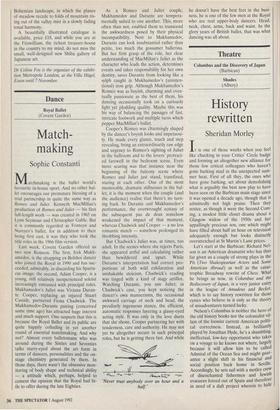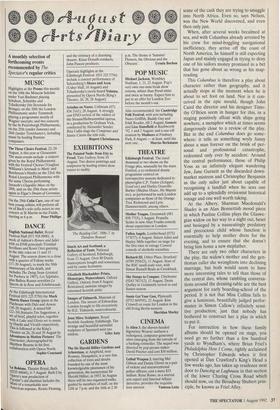Theatre
Columbus and the Discovery of Japan (Barbican) Shades (Albery)
History rewritten
Sheridan Morley
It is one of those weeks when you feel like chucking in your Critics' Circle badge and forming an altogether new alliance for those few critical colleagues who haven't gone barking mad in the unexpected sum- mer heat. First of all they, the ones who have gone barking, set about demolishing what is arguably the best new play to have been seen on the Barbican main stage since it was opened a decade ago, though that is admittedly not high praise. Then they notice, as though it were the Second Com- ing, a modest little closet drama about a Glasgow widow of the 1950s and her appallingly precious son, one which might have filled about half an hour on television adequately enough but looks distinctly overstretched at St Martin's Lane prices. Let's start at the Barbican: Richard Nel- son is an American dramatist who has thus far given us a couple of strong plays in the Pit (Two Shakespearian Actors and Some American Abroad) as well as the catas- trophic Broadway rewrite of Chess. What he brings us now, in Columbus and the Rediscovery of Japan, is a very junior entry in the league of Amadeus and Becket, which is to say history rewritten for those cynics who believe in it only as the theory of misadventures turned lucky. Nelson's Columbus is neither the hero of the old history books nor the colonialist vil- lain of the loonier current American politi- cal correctness. Instead, as brilliantly played by Jonathan Hyde, he's a shambling, ineffectual, low-key opportunist who takes on a voyage to he knows not where, largely because it will allow him to be called Admiral of the Ocean Sea and might guar- antee a slight shift in his financial and social position back home in Seville. Accordingly, he sets sail with a motley crew of disenchanted fishermen and Jewish evacuees forced out of Spain and therefore in need of a daft project wherein to hide some of the cash they are trying to smuggle into North Africa. Even so, says Nelson, was the New World discovered, and even then only just.
When, after several weeks becalmed at sea, and with Columbus already arrested by his crew for mind-boggling navigational inefficiency, they arrive off the coast of North America, he himself is still expecting Japan and mainly engaged in trying to deny one of his sailors money promised in a bet that has gone about as wrong as his map- reading.
This Columbus is therefore a play about character rather than geography, and it actually stops at the moment when he is about to set foot on land. Nor is it con- ceived in the epic mould, though John Caird the director and his designer Timo- thy O'Brien seem in hunger for this, in a staging positively afloat with ships going nowhere, a metaphor which at times seems dangerously close to a review of the play. But in the end Columbus does go some- where: it tells us something wryly funny about a man forever on the brink of per- sonal and professional catastrophe, redeemed only ever by accident. Around the central performance, those of Philip Voss as an infinitely elegant wandering Jew, Jane Gurnett as the discarded down- market mistress and Christopher Benjamin as the only sailor just about capable of recognising a landfall when he sees one add up to a splendidly revisionist historical voyage and one well worth taking.
At the Albery, Sharman Macdonald's Shades is an Alan Bennettish mood piece in which Pauline Collins plays the Glaswe- gian widow on her way to a night out, beset and besieged by a nauseatingly predatory and precocious child whose function is essentially to help mother dress for the evening, and to ensure that she doesn't bring him home a new stepfather.
There are only two other characters in the play, the widow's mother and the gen- tleman caller she wrongfoots into declining marriage, but both would seem to have more interesting tales to tell than those of the central duo, whose rambling conversa- tions around the dressing-table are the best argument for early boarding-school of the period. It is not that Miss Collins fails to give a luminous, beautifully judged perfor- mance in Simon Callow's infinitely sensi- tive production; just that nobody has bothered to construct her a play in which to put it.
For instruction in how these family albums should be opened on stage, you need go no further than a few hundred yards to Wyndham's, where Brian Friel's Philadelphia Here I Come, rightly acclaimed by Christopher Edwards when it first opened at Dan Crawford's King's Head a few weeks ago, has taken up residence next door to Dancing at Lughnasa in that section of the lower Charing Cross Road which should now, on the Broadway Shubert prin- ciple, be known as Friel Alley.



















































 Previous page
Previous page